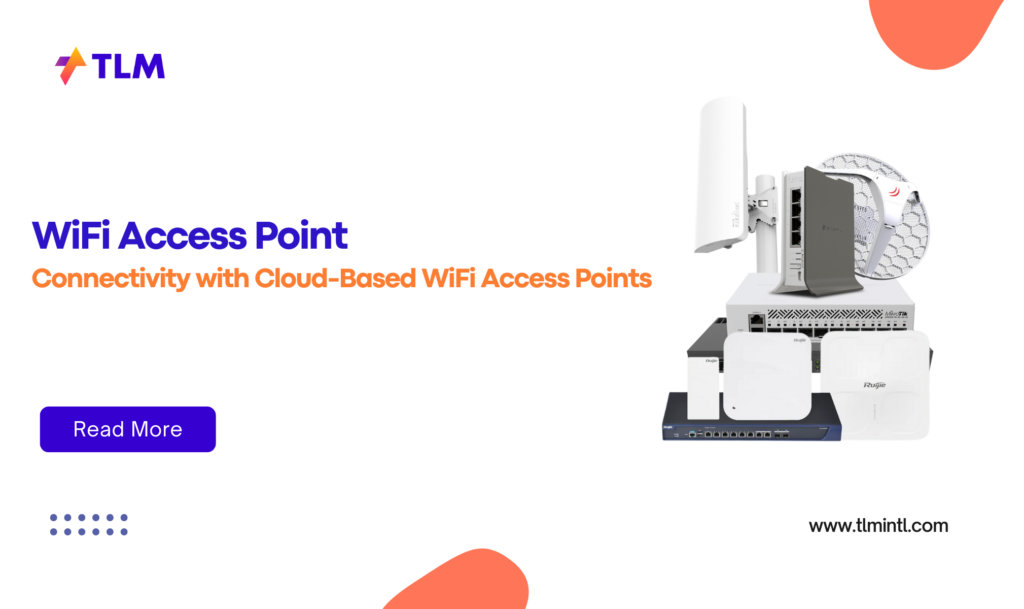Reliable and scalable wireless connectivity is no longer a luxury but a necessity. Businesses, educational institutions, healthcare facilities, and even small enterprises rely on seamless WiFi to drive productivity, enhance customer experiences, and support IoT ecosystems. Enter cloud-based WiFi access points, a revolutionary approach to networking that simplifies management, enhances scalability, and ensures robust performance. Whether you’re considering devices from Ubiquiti, HPE Networking, MikroTik, or Ruijie Networks, cloud-based solutions promise to redefine how we think about wireless connectivity.
What Are Cloud-Based WiFi Access Points?
A cloud-based WiFi access point is a wireless networking device that connects users to the internet while being managed remotely via a centralized cloud platform. Unlike traditional access points that require on-premises controllers or manual configurations, these devices leverage cloud computing to provide real-time management, monitoring, and updates.
This approach eliminates the need for complex hardware setups and allows IT administrators to oversee multiple locations from anywhere in the world. Whether it’s configuring SSIDs, monitoring traffic, or troubleshooting issues, all tasks can be performed with just a few clicks through an intuitive dashboard.
Key Features of Cloud-Based WiFi Access Points
Centralized Management
With cloud-managed platforms like those offered by MikroTik’s Tanaza or Ruijie Networks’ cloud solutions, administrators can control multiple networks from a single interface. This is especially beneficial for businesses with geographically dispersed locations.
Scalability
Adding new access points or expanding coverage is seamless. Devices like HPE Aruba’s Instant On AP32 allow businesses to scale their networks effortlessly as they grow.
Real-Time Monitoring and Analytics
Advanced analytics provide insights into network usage patterns, device performance, and potential security risks. Platforms like Ubiquiti’s UniFi allow for detailed reporting that aids in decision-making.
Enhanced Security
Cloud-based platforms automatically update firmware and apply security patches to protect against vulnerabilities. Features like client isolation and deep packet inspection further bolster security.
Ease of Deployment
Zero-touch provisioning enables quick installation without extensive technical expertise. Solutions like MikroTik’s ISPApp make deployment straightforward even for large-scale networks.
Cost-Effectiveness
By reducing the need for on-premises hardware and IT personnel, businesses can save significantly on operational costs while enjoying enterprise-grade performance.
How Cloud-Based WiFi Access Points Transform Connectivity
Simplified Network Management
Managing traditional networks often requires dedicated IT teams and on-site visits for troubleshooting or updates. Cloud-based solutions eliminate this complexity by enabling remote management through intuitive dashboards. For instance, MikroTik’s Tanaza platform allows administrators to configure multiple access points across different locations with ease.
Enhanced Performance with AI Integration
Many modern cloud-managed systems integrate artificial intelligence (AI) to optimize network performance dynamically. HPE Aruba’s AirMatch technology ensures automated channel optimization and bandwidth allocation for consistent connectivity. Similarly, Ruijie Networks leverages AI-powered features to support high-density environments with minimal latency.
Scalability Without Limits
As businesses grow, so do their networking needs. Cloud-based WiFi access points like Ubiquiti’s AC Pro make it easy to scale up without significant capital expenditure4. Whether you need to expand coverage in a single office or across multiple branches worldwide, the process is seamless.
Improved Security Frameworks
Security remains a top concern in today’s digital age. Cloud-managed solutions offer advanced security features such as automatic firmware updates, real-time threat detection, and centralized policy enforcement. HPE Aruba’s Wi-Fi 7 solutions even provide built-in malware protection and secure IoT integration.
Cost Savings Through Operational Efficiency
Traditional networks often involve substantial upfront investment in hardware and ongoing maintenance costs. In contrast, cloud-based systems operate on subscription models that reduce capital expenditure while offering predictable operating costs.
Use Cases Across Industries
Enterprises
Large organizations benefit from centralized control over extensive networks spanning multiple offices or campuses. Devices like HPE Aruba Networking APs cater to such needs with features like multi-SSID configurations and robust security protocols.
Small and Medium Businesses (SMBs)
SMBs often lack dedicated IT teams but still require reliable connectivity. Solutions like MikroTik’s cloud-managed platforms provide cost-effective options tailored for smaller setups.
Education
Schools and universities increasingly rely on digital tools for learning. Ruijie Networks’ high-density access points ensure seamless connectivity in classrooms and lecture halls.
Hospitality
Hotels demand reliable WiFi for guests while ensuring secure internal operations. Ubiquiti’s UniFi devices offer customizable guest portals alongside enterprise-grade performance.
Comparing Leading Brands: Ubiquiti vs HPE Networking vs MikroTik vs Ruijie Networks
| Feature | Ubiquiti AC Pro | HPE Aruba Instant On AP32 | MikroTik Tanaza Platform | Ruijie Networks Wi-Fi 7 |
| Management Platform | UniFi Controller | Aruba Central | Tanaza Dashboard | Ruijie Cloud |
| Scalability | High | Very High | High | Very High |
| Security Features | WPA3 Encryption | Malware Protection | Centralized Policies | Deep Packet Inspection |
| Ideal Use Case | Offices & Hotels | SMBs & Enterprises | SMBs & Multi-Vendor Deployments | High-Density Environments |
| Cost-Effectiveness | Moderate | Moderate | High | Moderate |
Why Choose TLM International for Your Networking Needs?
TLM International is a trusted leader in distributing computer and networking equipment globally. With competitive pricing and exceptional customer service, TLM ensures resellers and system integrators have access to cutting-edge technologies like cloud-based WiFi access points from top brands such as Ubiquiti, HPE Networking, MikroTik, and Ruijie Networks.
Conclusion
Cloud-based WiFi access points are revolutionizing how businesses approach connectivity by offering centralized management, scalability, enhanced security, and cost savings. Whether you’re managing a single office or a global enterprise network, devices from Ubiquiti, HPE Networking, MikroTik, or Ruijie Networks provide tailored solutions to meet your needs.
By embracing this transformative technology through trusted distributors like TLM International, businesses can future-proof their networks while enjoying unparalleled flexibility and performance.






